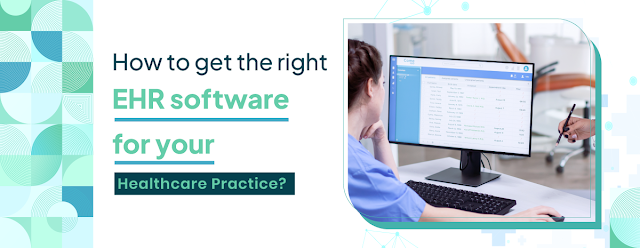How Do You Get the Right EHR Software For Your Healthcare Practice?
Determine your Needs.
Your practice's needs may differ
depending upon various factors, such as the number of patients you see, the
number of doctors and associates you have, your specialties, and the clinic
size. At the same time, you will need to consider your future needs as you may
plan to grow your business in the future. Also, identify your high-priority
needs and match them to the features of the EHR you propose to purchase. As you
may have guessed, the larger the practice, the more needs you will likely have.
You may even consider a specialty-specific EHR system. Such systems are generally easier to
customize. These include templates and features for your practice, which make
their use easier.
Consider Purchasing a Certified EHR System
You can also know what you want
by purchasing only certified systems. These systems are approved by the Office
of the National Coordinator for Health Information Technology (ONC) so that you,
as a physician, can make the right choice. Some certified EHR systems can also
qualify for federal EHR incentives. This comes under the American Recovery and
Reinvestment Act 2009 (ARRA). Accordingly, the accredited systems must comply
with "meaningful use" requirements to qualify for ongoing incentives.
Go for the Right System Architecture
EHRs can be categorized as server
or cloud EHRs, depending on their architecture. Using an onsite server gives
you control over your medical records. This also means your EHR offers central
storage. For some users, this is preferable because it helps them meet HIPAA
security obligations. However, the only issue with this method is that
maintenance and upgrades are your responsibility. However, you can access your
medical records via the Internet using cloud EHR System Software.
Carefully Review the Features
An EMR system's features must be
reviewed before you purchase it. Ensure it has all the essential functions for
adequately managing your crucial records. Also, ensure it can be scheduled so
that addressing patients' appointments becomes simple. It should be possible
for your staff to enter patient details in it without any trouble. At the same
time, it should also have an auto-reminders feature to remind patients about
their appointments. Also, check if it has real-time record keeping and
tracking. This feature helps authorized staff to access the most up-to-date
information on a patient. It includes standard features like task management,
signing notes, reviews, and patient messages. Such a feature saves valuable
time during a patient's recurring visits.
Why Not Request a Demo?
Your desired EHR may have several
features that the vendor may have highlighted. However, this doesn't mean you have
the green light to purchase it. Buying EHR Service Software only after you have
thoroughly reviewed it is prudent. You can request a demo to see how certain
features work. Make sure your team members are also involved in the demo.
Salespersons may show extra interest in trying to sell their product to you.
Don't take the salesman's words for granted. Do your checks and avoid being
swayed when they try to showcase their product in the best light.
Consider Client Reviews
Since there have probably been
other customers before you, you should read past and current client reviews.
You will most likely get a clear insight into the software's functioning,
performance, and reputation.
Verify if Customer Service is
Effective
At the same time, consider
customer service as a critical factor while finalizing the vendor. You don't
want delayed support for your crucial issues. Verify their availability and if
they can be contacted pronto if your issue needs an escalation. Some vendors
offer 24/7 support for their EHR
systems. You may be able to talk to a customer support individual via
chat or a call. Also, determine if they offer free support or if it is
chargeable.
Conclusion
EHR use is growing around the
world. This means you must spend your time and money on an EHR that genuinely
works for you. The EHR Software you may
be currently evaluating may or may not be able to serve your needs. If it doesn't
hit the mark, you may need another one. Try to be patient while evaluating
various vendors. Developing an RFI to ensure vendors provide the correct
information about their EHRs is a good idea.




Comments
Post a Comment